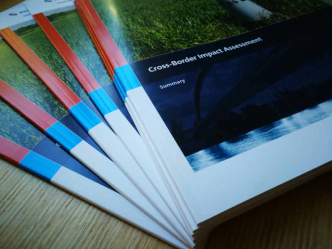European Court of Justice upholds ITEM investigation
In the judgement of 18 June 2019 the Court of Justice of the European Union ruled in the case C-591/17 that the German ‘Autobahnvignette’ is in violation of EU law. Our summary can be found here.
In the judgment of 18 June 2019, the Court of Justice of the European Union ruled in case C-591/17 that the German ‘Autobahnvignet’ violates EU law. You can find our summary here.
The Court finds that the infrastructure user charge, combined with the exemption from motor vehicle tax enjoyed by owners of vehicles registered in Germany, constitutes indirect discrimination on grounds of nationality and is contrary to the principles of free movement of goods and freedom to provide services. As regards the prohibition of discrimination on grounds of nationality, the Court finds that the effect of the exemption from motor vehicle tax for the owners of vehicles registered in Germany is to offset in full the infrastructure user charge paid by them, so that the economic burden of that charge falls de facto exclusively on the owners and drivers of vehicles registered in other Member States.
This ruling is especially good news for border regions, because the ruling also provides an opportunity to find integrated European solutions for taxing air pollution.
The potential impact of German tolls on border regions
Martin Unfried
Barbara Hamacher
Introduction
In January 2017, the German Bundestag passed the Infrastrukturabgabengesetz (Infrastructure Charges Act). In March 2017, the Bundesrat then voted for the legislation to enter into force. The measure – known as the ‘car toll’ – is now expected to be introduced in 2019. The law requires owners of foreign-registered vehicles to buy a vignette for use on German motorways. The fees depend on the duration of use and emissions of the vehicle. Owners of vehicles registered in Germany also have to pay this tax, but it is deducted from their motor vehicle tax. The law was passed amid a public debate about possible discriminatory effects on owners of foreign-registered vehicles and the estimated revenue for the state. This dossier deals with the possible effects of the toll on border regions, such as the Meuse-Rhine Euroregion (EMR). In that context, the Institute for Transnational and Euregional Cross-border Cooperation and Mobility / ITEM conducted an online survey of motorists from the Belgian and Dutch part of the EMR, to which 422 people responded. Qualitative interviews were also conducted with German experts in tourism, marketing and retail. The German car toll could thus have negative effects on the EMR – the border area between Germany, the Netherlands and Belgium – something that was not included in the federal government’s assessment. In particular, these include the unresolved legal issue of discrimination against EU citizens (1), the possibility of influencing future EU measures on tolls (2), the issue of financial losses for certain sectors in Germany and for the regional economy (3), the negative impact in terms of emissions and noise from traffic avoiding the toll (4), and the fundamentally negative effects on regional cohesion (5).
Legal uncertainty is not good for border regions
Continued legal uncertainty can be detrimental to border regions, especially if it leads to complaints to the European Court of Justice. An analysis of the legal studies carried out so far shows that, despite a green light from the European Commission, the ECJ could still give a negative ruling. In that case, there would be years of legal uncertainty, which could create uncertainty for companies (in terms of investments in the Euroregion) and employers (in terms of vocational training in the Euroregion).
German toll stands in the way of a European solution
In principle, German tolls could hinder rather than facilitate the introduction of the uniform EU-wide toll system proposed by the European Commission. It is unlikely that a German government would replace the country’s own system just a few years after its controversial introduction (which works on the basis of time rather than distance). There could conceivably be a domino effect, with Germany’s neighbours introducing their own systems. This could have very negative consequences for border regions, which will mainly suffer from uncoordinated systems. This problem was recognised by survey respondents. 63% are against Belgium and/or the Netherlands introducing their own toll system and 44% are against a uniform EU-wide toll system.
Changing driving habits with economic and labour market implications
The survey suggests that people from neighbouring countries will change their driving behaviour as a result of the tolls, and limit their trips to Germany. 40% of respondents said they will drive to Germany as little as possible because of the toll. After the introduction of the toll, 11% of respondents who currently cross the border at least once a week will do so less. Of those who currently cross the border at least once a week, 17% will reduce the number of trips. The number of respondents who only travel to Germany occasionally will increase by 24%. The survey suggests that retail and tourism will be affected. According to the responses, the main reasons for travelling to Germany are mainly shopping (63%), leisure/leisure/dining out (58%), shopping (46%) and holidays (39%). These figures were confirmed by the reviews of German experts. At the Aquis Plaza shopping centre in Aachen, for example, many customers come from Belgium and the Netherlands – as many as 25% on Saturdays, according to a 2016 survey. So businesses on the German side of the border have good reason to fear loss of revenue if their customer base declines.
14% of respondents said they work in Germany. 29% cross the border into Germany for business appointments. Cross-border commuters have little chance of avoiding annual tolls. Public transport is not an option for most. Companies in Belgium and the Netherlands that operate across the border have to charge extra for tolls. The scale of the tolls (older, more polluting cars pay more) suggests that low-income border commuters (who often own older cars) and small businesses (with few vehicles) will be disproportionately affected. In particular, workers who have never worked in Germany before will find it more difficult to work in Germany. For them, the toll represents a new financial and administrative barrier. In that respect, the toll can be considered an additional psychological barrier to cross-border work and an open cross-border labour market.
Change in driving habits may lead to increased emissions and noise in built-up areas
Motorists who want to avoid the toll may cause environmental problems: 46% of respondents plan to use secondary roads once the toll is introduced so they do not have to pay tolls. This could place a significant burden on border communities on both sides of the border in terms of emissions and noise pollution. As traffic avoids the toll, local traffic could become more heavily congested, increasing noise pollution and accident risk. The toll, which was intended as a measure to protect the environment, could actually harm the environment; the financial incentives to avoid the highways are greater, especially for people with older cars with higher emissions.
Negative effects on Euroregional awareness
With the introduction of the toll there will be a kind of psychological barrier: 83% of respondents say the border with Germany will be more tangible with a toll. 84% agree that the toll will reduce cross-border mobility. Overall, sentiment towards the toll is not good: 84% of respondents do not think the toll makes sense; 88% are negative or very negative about it. 64% say they feel discriminated against by the toll. This negative reaction in neighbouring countries may have a negative impact on cross-border interaction between citizens, clubs, businesses and governments. One of the main achievements of European integration is that border crossings are simple and immediate. With tolls, people have to decide whether or not to pay and, if so, for how long. A toll does not make border crossing easy and immediate, as border residents would like. So it could be a step backwards for cross-border cohesion.


